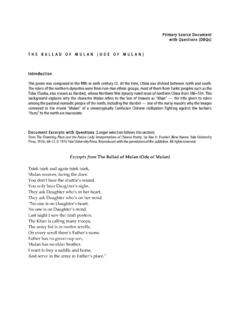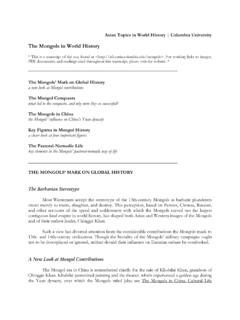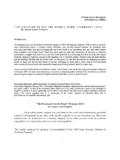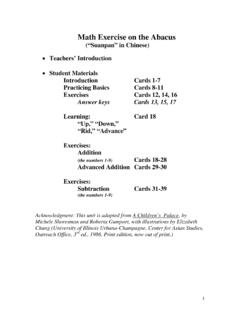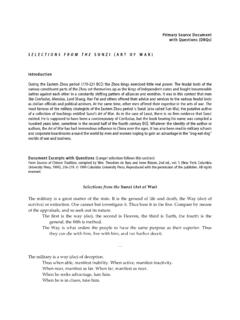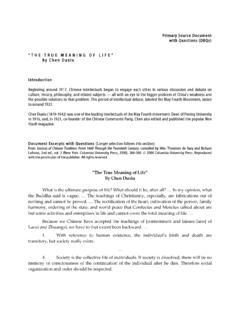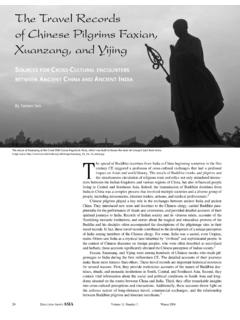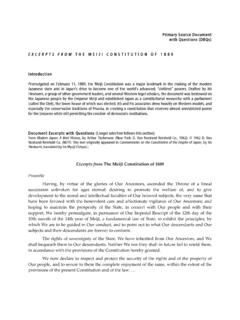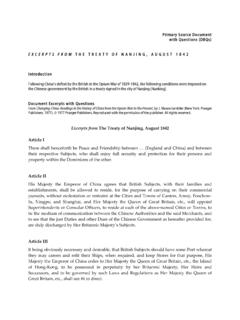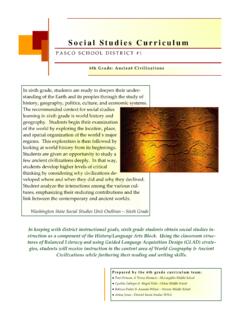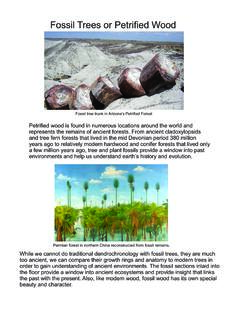Transcription of fillmore perry letters - Columbia University
1 Primary Source Document with Questions (DBQs) letters FROM PRESIDENT MILLARD fillmore AND NAVY commodore MATTHEW C. perry TO THE EMPEROR OF japan (1852-1853) Introduction In 1852, commodore Matthew Calbraith perry (1794-1858) was dispatched to japan by President Millard fillmore (1800-1874) in command of four warships, including two steam frigates. The squadron arrived in Uraga harbor, near the Tokugawa capital of Edo, on July 8, 1853. As expressed in the following letter from President fillmore to the Japanese Emperor, delivered by perry to the worried Tokugawa officials who greeted him, the United States was eager to break japan s seclusion policy, sign diplomatic and commercial treaties, and thus open the nation to the Western world.
2 For the Japanese, who had carefully regulated overseas contacts since the seventeenth century and whose technology could not compare to that displayed by the American squadron, perry s arrival and President fillmore s letter were unwelcome and ominous, even if not entirely unexpected. commodore perry stayed in Uraga for fewer than ten days in 1853, withdrawing to the China coast with his ships. As he promised in his letter of July 14, 1853, however, he returned to japan about six months later with a much larger and more intimidating fleet, comprising six ships with more than 100 mounted cannon. In March of 1854, the Tokugawa shogunate capitulated to all the American demands, signing the Treaty of Kanagawa with perry .
3 Selected Documents with Questions Letter from President Millard fillmore and first letter from commodore Matthew perry from Narrative of the Expedition of an American Squadron to China and japan , performed in the years 1852,1853, and 1854, under the Command of commodore M. C. perry United States Navy, by Order of the Government of the United States, compiled by Francis L. Hawks, vol. I (Washington, , Nicholson, Printer, 1856), 256-259. Second letter from commodore Matthew perry from Meiji japan through Contemporary Sources, Volume Two: 1844-1882, compiled and published by the Centre for East Asian Cultural Studies, c/o The Toyo Bunko, Honkomagome 2-chome 28-21, Bunkyo-ku; Tokyo, 113 japan .
4 Reproduced with the permission of the publisher. All rights reserved. From Millard fillmore , President of the United States of America, to His Imperial Majesty, the Emperor of japan November 13, 1852 GREAT and Good Friend: I send you this public letter by commodore Matthew C. perry , an officer of the highest rank in the navy of the United States, and commander of the squadron now visiting your imperial majesty s dominions. I have directed commodore perry to assure your imperial majesty that I entertain the kindest feelings towards your majesty s person and government, and that I have no other object in sending him to japan but to propose to your imperial majesty that the United States and japan should live in friendship and have commercial intercourse with each other.
5 Primary Source Document with Questions (DBQs) on letters FROM PRESIDENT MILLARD fillmore AND NAVY commodore MATTHEW C. perry TO THE EMPEROR OF japan (1852-1853) Asia for Educators l Columbia University l Page 2 of 6 The Constitution and laws of the United States forbid all interference with the religious or political concerns of other nations. I have particularly charged commodore perry to abstain from every act which could possibly disturb the tranquility of your imperial majesty s dominions. The United States of America reach from ocean to ocean, and our Territory of Oregon and State of California lie directly opposite to the dominions of your imperial majesty.
6 Our steamships can go from California to japan in eighteen days. Our great State of California produces about sixty millions of dollars in gold every year, besides silver, quicksilver, precious stones, and many other valuable articles. japan is also a rich and fertile country, and produces many very valuable articles. Your imperial majesty s subjects are skilled in many of the arts. I am desirous that our two countries should trade with each other, for the benefit both of japan and the United States. We know that the ancient laws of your imperial majesty s government do not allow of foreign trade, except with the Chinese and the Dutch; but as the state of the world changes and new governments are formed, it seems to be wise, from time to time, to make new laws.
7 There was a time when the ancient laws of your imperial majesty s government were first made. About the same time America, which is sometimes called the New World, was first discovered and settled by the Europeans. For a long time there were but a few people, and they were poor. They have now become quite numerous; their commerce is very extensive; and they think that if your imperial majesty were so far to change the ancient laws as to allow a free trade between the two countries it would be extremely beneficial to both. If your imperial majesty is not satisfied that it would be safe altogether to abrogate the ancient laws which forbid foreign trade, they might be suspended for five or ten years, so as to try the experiment.
8 If it does not prove as beneficial as was hoped, the ancient laws can be restored. The United States often limit their treaties with foreign states to a few years, and then renew them or not, as they please. I have directed commodore perry to mention another thing to your imperial majesty. Many of our ships pass every year from California to China; and great numbers of our people pursue the whale fishery near the shores of japan . It sometimes happens, in stormy weather, that one of our ships is wrecked on your imperial majesty s shores. In all such cases we ask, and expect, that our unfortunate people should be treated with kindness, and that their property should be protected, till we can send a vessel and bring them away.
9 We are very much in earnest in this. commodore perry is also directed by me to represent to your imperial majesty that we understand there is a great abundance of coal and provisions in the Empire of japan . Our steamships, in crossing the great ocean, burn a great deal of coal, and it is not convenient to bring it all the way from America. We wish that our steamships and other vessels should be allowed to stop in japan and supply themselves with coal, provisions, and water. They will pay for them in money, or anything else your imperial majesty s subjects may prefer; and we Primary Source Document with Questions (DBQs) on letters FROM PRESIDENT MILLARD fillmore AND NAVY commodore MATTHEW C.
10 perry TO THE EMPEROR OF japan (1852-1853) Asia for Educators l Columbia University l Page 3 of 6 request your imperial majesty to appoint a convenient port, in the southern part of the empire, where our vessels may stop for this purpose. We are very desirous of this. These are the only objects for which I have sent commodore perry , with a powerful squadron, to pay a visit to your imperial majesty s renowned city of Edo: friendship, commerce, a supply of coal and provisions, and protection for our shipwrecked people. We have directed commodore perry to beg your imperial majesty s acceptance of a few presents.
